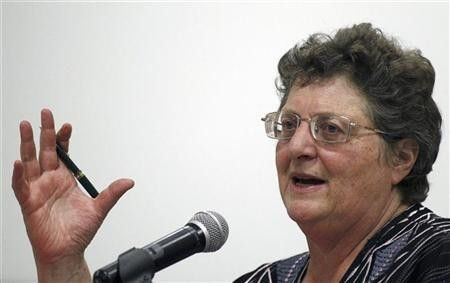S.Africa holds repo rate flat, rand slides

South Africa's Reserve Bank left its repo rate unchanged on Thursday and struck a dovish note as it balanced its concerns for domestic economic growth with an expected increase in inflation stemming from a sharply weaker rand.
Governor Gill Marcus said the bank's Monetary Policy Committee discussed a cut in the benchmark lending rate from its current 30-year low of 5.5 percent, although the final decision to keep it on hold was unanimous.
The rand hit fresh 26-month lows to the dollar and bonds trimmed losses after the MPC statement.
Although annual inflation was steady at 5.3 percent in August, the bank said it still expected it to trend higher, with administered prices, such as fuel and power, and food the main upside risks.
The MPC said it was concerned about the value of the rand, which has plunged nearly 20 percent against the dollar in the last three weeks as South Africa's currency has finally fallen victim to a global sell-off of emerging market assets.
The depreciation of the rand poses a potential upside risk to the inflation outlook, Marcus said.
However the degree of this risk will depend on the extent and persistence of the depreciation trend, which in turn will be influenced by the duration and intensity of global risk aversion.
RATE CUT?
Marcus highlighted the fragility of the continent's biggest economy and left the door open for a rate cut should there be a marked slowdown due to the global financial crisis.
She said emerging markets such as South Africa would still experience faster growth but remained vulnerable to a significant slowdown in developed markets.
Downside risks are seen to come from the heightened risks to global growth and its consequences for the domestic economy, Marcus said.
The Reserve Bank cut its growth forecast to 3.2 percent for 2011 from 3.7 percent. It sees the economy growing by 3.6 percent in 2012 and 4.4 percent in 2013.
The clear message coming across from the SARB is that global growth concerns are overriding, and that in the event of a severe shock, the SARB is more likely to be cutting interest rates, said Razia Khan, head of Africa research at Standard Chartered.
All 27 economists polled by Reuters last week predicted the Reserve Bank would leave rates unchanged. Four saw a chance of a rate cut either in November or early next year.
MARKET REACTION
Bonds trimmed losses after the statement, with the yield on the 2015 bond at 7.03 percent from 7.06 before the data. The rand hit a new 26-month low of 8.34 after the statement.
The dovish nature of the statement could fuel expectations of a rate cut this year. This could provide a boost to equity market inflows, which could help to stem the rand's slide, Standard Bank said in a note.
Marcus said the current growth trajectory did not bode well for employment creation.
The government asked the central bank last year to consider economic growth and jobs more in its deliberations and not focus solely on inflation.
At more than 25 percent of the workforce, South Africa's unemployment rate is among the highest in the world and is regarded as a potential source of social instability.
© Copyright Thomson Reuters {{Year}}. All rights reserved.





















